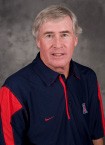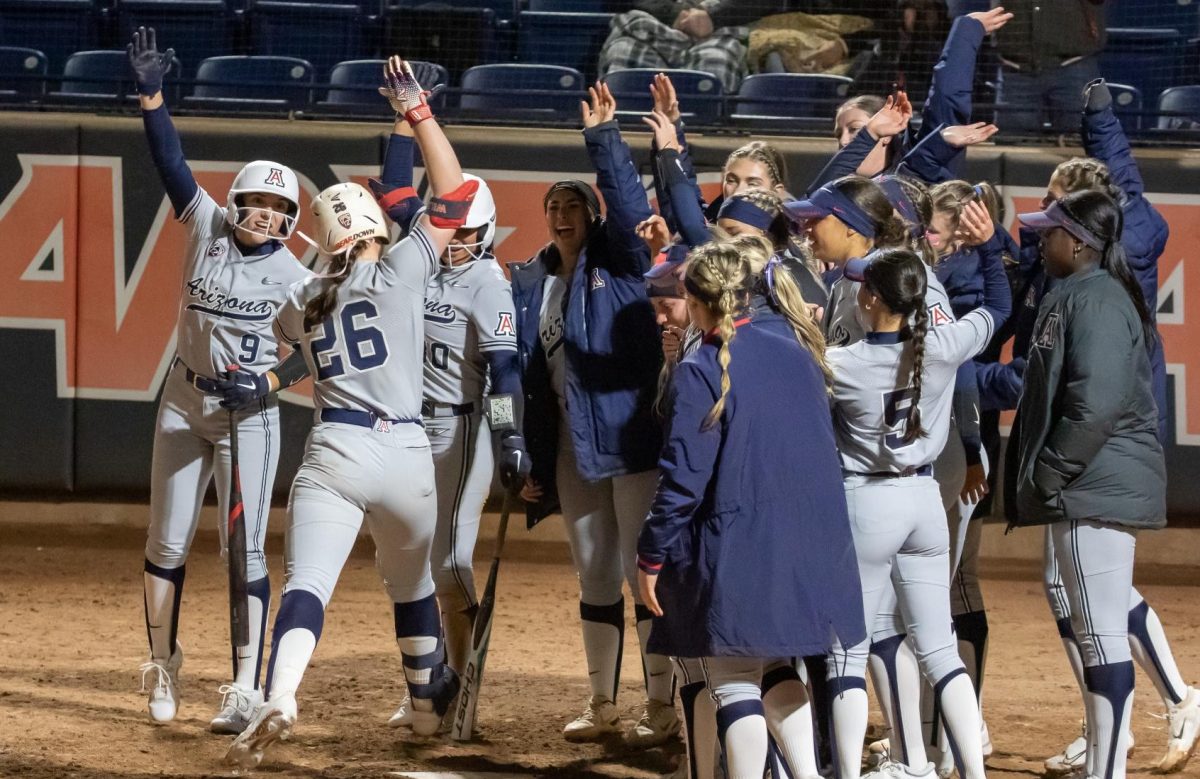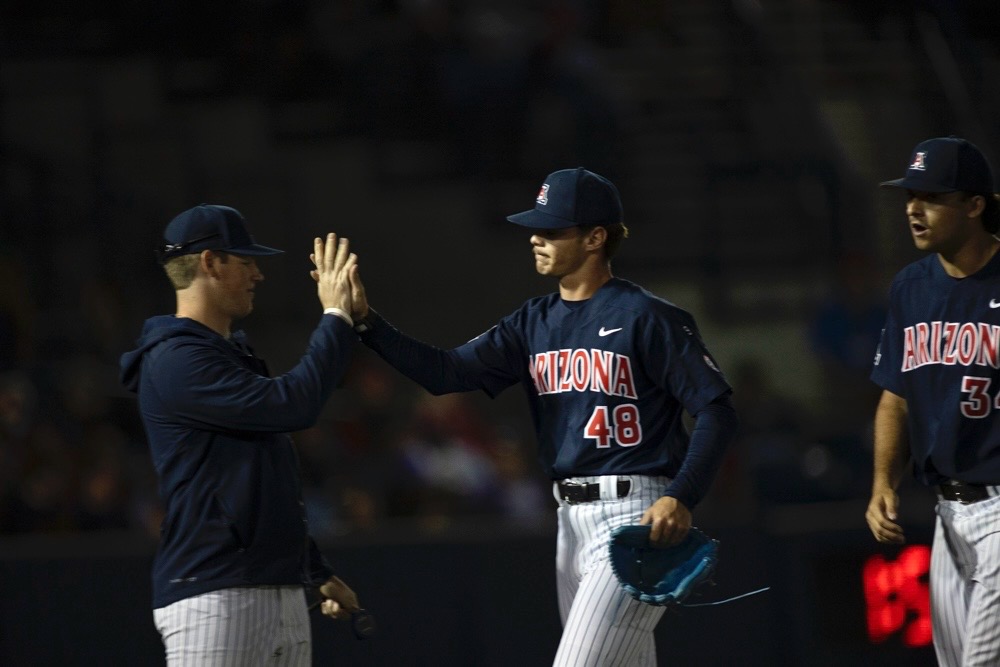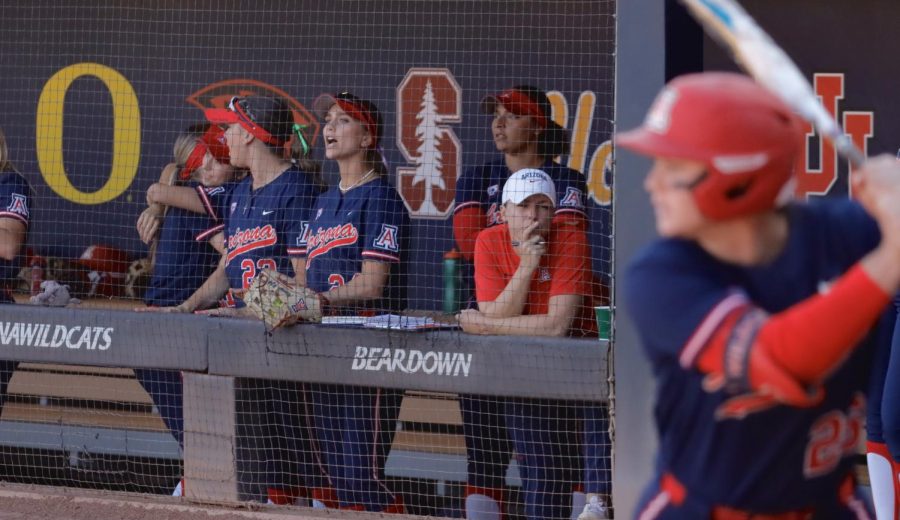For 18 years, Jim Rosborough coached alongside Lute Olson in Arizona on some of the greatest teams the Wildcat basketball program has ever witnessed. Yet, after a falling out with the iconic basketball coach, Rosborough’s basketball life ended and he moved on to something new.
Athletic training? The pros? Women’s basketball? No, no and no. Rosborough decided to take his talents to, of all places, the tennis courts.
As random as his new position as volunteer assistant coach for the Arizona women’s tennis team may sound, interestingly enough, tennis has been a part of his life since he was only 12 years old and living in Moline, Ill.
“”We had a guy up in our neighborhood back in Moline who was probably the best tennis player in Moline, and he was in the neighborhood so my parents knew him,”” Rosborough said. “”When I was 10, I got some lessons from him and there was probably a time, when I was probably 12, where I would just bang around like a hack.””
He didn’t start taking tennis seriously until he went to college at Iowa, where he honed his skills in a tennis class that was taght by the school team’s head coach.
“”A tennis class and I got credit for it,”” Rosborough laughed.
Rosborough coached basketball in Iowa and Illinois for a while, and may never have even made his way down to Arizona. After coaching with Olson at Iowa for nine years and assisting J.D. Barnett for a year at Tulsa, Rosborough was hired as head basketball coach at Northern Illinois.
After compiling a 28-56 record in three seasons, Rosborough was let go when a new athletic director took over the program. Rosborough left the new coach with two solid recruiting classes, and the year after he was let go, the team went on to win 26 games and make the NCAA tournament.
“”That was all my recruits, all my starters,”” Rosborough said. “”I told my wife, if I had stayed there a couple of years, we had another good class coming in. You never know maybe the (University of) Illinois (coaching job) opens up and I’m never down here (in Tucson). But it worked out well. I loved my time here.””
Despite a mostly fulfilling experience as a Wildcat assistant coach, the road wasn’t always smooth for Rosborough. But when times got tough, he would escape to playing tennis with friends.
One of those friends, former co-owner of the Rialto Theatre Jeb Schoonover, shared similar frustrations with Rosborough, which enabled them to develop a strong relationship.
“”He had the same circumstances with Rialto as I probably did with Lute,”” Rosborogh said. “”He didn’t quite get credit for all the good stuff they did at Rialto, then new guys come in. Same thing here. I don’t say that I haven’t gotten my fair credit but certainly, with Lute, it didn’t end probably as it should have for two people who had been friends for 30-something years.””
After Rosborough was shadily forced out of the Arizona basketball program by Olson in 2007, he accepted a position with the athletic department where he assisted with fundraising, development and public relations. However, the itch to coach remained.
After helping Pima Community College to its best season in school history as an assistant coach, Rosborough expected to be named the head coach after then-head coach Karl Pieroway resigned. But the school went another way, and Rosborough was once again standing in the middle of a coaching whirlwind.
Suddenly, a man that had known nothing but consistency was out of a job again.
It didn’t last long, though, thanks to Arizona women’s tennis head coach Vicky Maes.
“”Ros and I have been really good friends for a long time,”” Maes said. “”Right when he was done at Pima, we were having breakfast one day and the idea (of him coaching) just kind of came about.””
Maes, who had seen Rosborough play tennis when she was a student-athlete at Arizona, asked if he would be interested in volunteering on her staff.
Rosborough happily accepted, but was aware of the challenges that were ahead of him. Not just in the sport, but in the players.
“”Anytime you come into a women’s program there is a lot of emotions involved,”” Maes said. “”When Ros joined the staff … they may have wondered ‘what’s a basketball guy going to do for us?’ He has really kind of had to earn their trust.””
Despite a childhood-long knowledge of tennis, there was a steep learning curve for Rosborough. But his success in the basketball ranks gave Maes and her top assistant Ryan Stotland confidence in their newest — and oldest — staff member.
“”I think I’ve been very positive, I’ve picked up some stuff particularly in singles where I can watch whoever I’m helping on the court,”” Rosborough said. “”Ive worked a lot with Jane (Huh) and Susan (Mc Rann), sometimes with the other girls. I think, technically I can give them more stuff than (I could earlier in the season).””
If one thing has translated from his time as a basketball coach to his new job in tennis, it has been his passion and commitment to being the best coach he can possibly be.
“”The fact that he cares about the kids really came across early on and they just love having him on the team,”” Maes said. “”He’s really gone above and beyond taking on this job.””
Rosborough has even managed to help his fellow coaches, too.
“”We’ve both learned from each other,”” Stotland said. “”We’ve learned a lot about the team aspect and how a team should play, trying to balance both individual sports, which tennis is, and team sports into one.””
Rosborough has no intentions of overstepping his bounds and getting in the way of Maes or Stotland’s tuteledge for the girls, but he has tried contributing things the best way he can. Though Rosborough doesn’t know where he’ll be next year — back with the women’s tennis team or a return to men’s basketball somewhere? — his impact this year can be seen in the gratitude shown by his players.
“”In all my years of coaching, I’ve had a few players who thanked me or parents thank me at the end of a season or career. I’ve already had two or three girls saying ‘Thanks, you’ve been a help,’ he said with a wide smile on his face. “”I’m just trying to be positive with the kids, keep them upbeat, keep them motivated.””
While Rosborough maintains that the reason the team is 15-4 and No. 31 in the country is due solely to the coaching of Maes and Stotland, the contributions of a man that as an assistant basketball coach never missed the NCAA tournament, won the national championship in 1997, and helped Pima to a strong season last year can’t be denied.
Call him a good luck charm. Call him a great coach. All that matters is he knows how to win games, be it basketball or tennis.
Rosborough’s take on D-Will
In his time as a basketball coach at UA, Jim Rosborough coached some really talented eventual NBA players like Channing Frye, Jason Terry, Luke Walton and Andre Iguodala, among others. So when giving his take on whether or not Derrick Williams should declare for the NBA draft, he spoke from prior experience.
“”I don’t think it would kill (Williams) to stay another year,”” Rosborough said. “”But I’m also realistic. Sean (Miller) is a very, very good coach, and I think another year here and D-Will would be better.””
But before Arizona faithfuls get their hopes up, Rosborough was honest in his realistic assessment.
“”He’s one of the top three or four players in the country and he’s going to be drafted very, very high and you can’t risk that,”” he said. “”You can’t risk injury or anything now. You’re going to be in the top five, maybe top three. (He’s) going to be a wealthy young man. You gotta go.””
Rosborough referenced a player from the late 90s who was in a similar situation. NCAA Tournament hero Miles Simon, much like Williams, was faced with the decision after he emerged in on the national stage in March.
“”After we won the title in 1997, in hindsight (Simon) probably should have gone (to the NBA),”” Rosborough said. “”He stayed. Coming off that great tournament he had he probably would have been drafted somewhere in the top 15 and gotten guaranteed money. He didn’t leave so some of the things the pros didn’t like were exposed the next year and he was a second rounder.””









